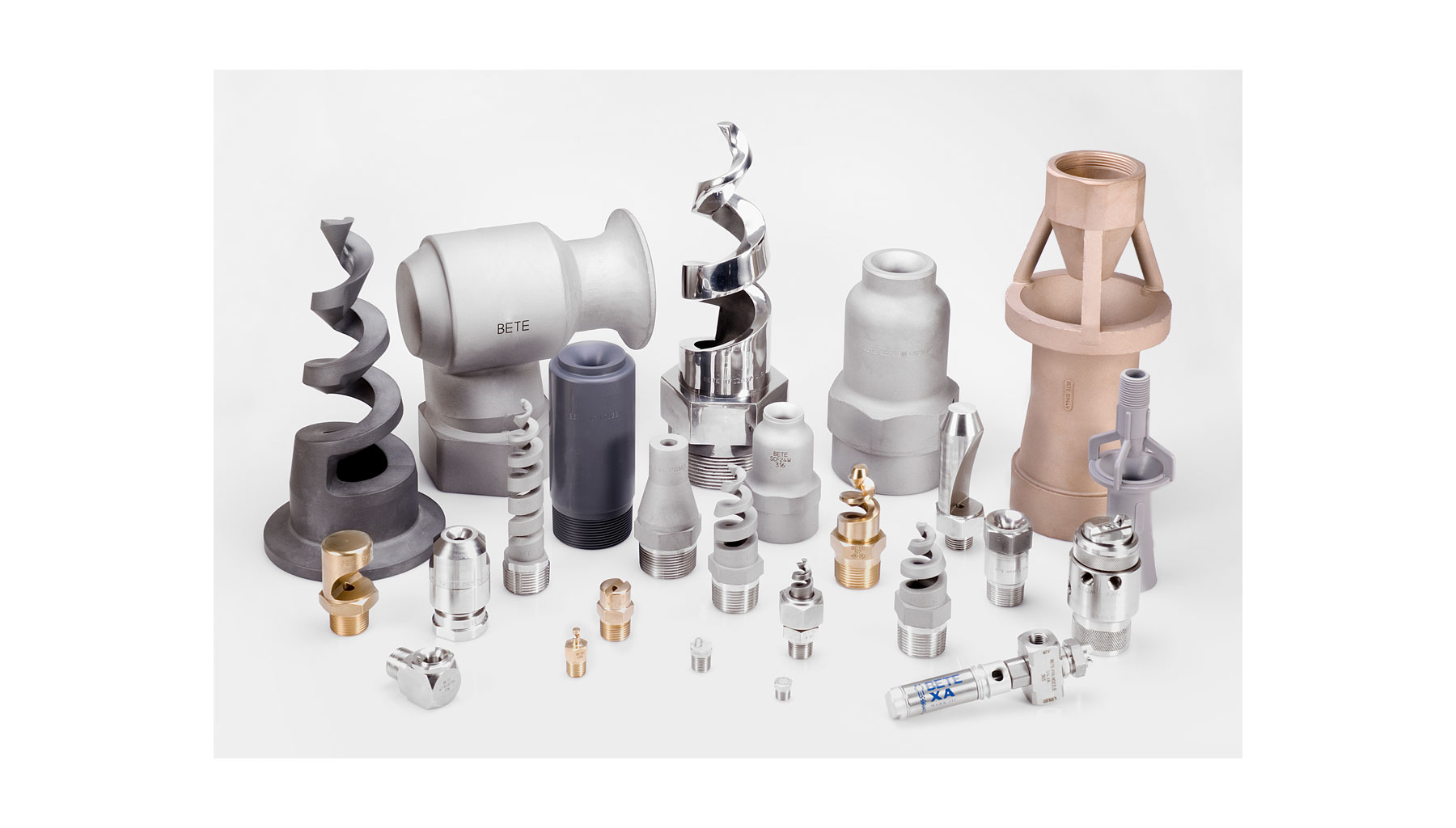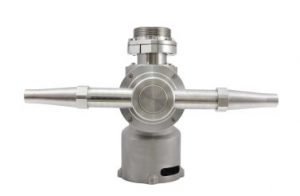
This article draws upon the specifics of our spray nozzle product business but has broadly applicable lessons for any business selling specialised products across a diverse range of business. So even though we talk about spray nozzles (our products) these products could be replaced with any number of other similar or not so similar niche products.
One of our business divisions, The Spray Nozzle People, is wonderfully diverse in its customer base. The nozzles and tank cleaning heads we sell can be found anywhere from food processing plants, to sewage farms, to recycling plants, to offshore fire protection systems, to chemical plants to the sets of Hollywood blockbusters. Anywhere where there is a process that requires the distribution or atomisation of a fluid is a potential punter for us.
This may sound like a very luxurious position to be in. Indeed, the breadth of our business is one of its strengths. A dip in the economic fortunes of one sector is unlikely to damage us too much. But this strength is also a weakness when it comes to business development and marketing. As our customers are so diverse it is often hard to work out exactly where to spend one’s marketing budget. A legitimate case could be me made for approaching almost any industry you care to mention but, of course, such a broad spread of marketing can only be achieved by those with very deep pockets.
Apart from the sheer economic impossibility of a scatter gun approach there are other concerns about mass marketing. Foremost is the fact that most of our potential customers will spend money with us on specific projects. They then might buy replacement product every few years after that but there is no continual commercial relationship so it is, rather, a sporadic and project-based relationship.
To make matters worse many potential customers within a given sector only have a very limited use for our products. They might need perhaps only a few hundred pounds worth of product a year with little or no juicier projects because they simply don’t have those kinds of application. These low spend customers, although great to have, are simply not worth spending thousands of pounds or lots of time marketing to.
Multi-niche marketing
So, this has led us to the concept of multi-niche marketing. We cannot cover all potential customers with a broad-spectrum marketing plan to all sectors; we are simply not big enough to do this. We can’t even take a sector like food processing and target it, because again, it’s just too big. The cost associated with consistent advertising within the food tech press would be too large for a business of our modest size. Instead we tend to get a bit smarter than this and really try to understand the niches and profitable specific processes within a sector. We then look at ways in which we can target and attract other customers who have a similar process and hence a similar high spend.
 A good example to this approach would be in our storm tank cleaning processes. Just over six years ago we were approached by a water utility company that wanted to clean a large storm water attenuation tank in an automated way. This was an application we didn’t know about or even consider prior to this enquiry. We helped develop a solution for the customer for that instance and then asked ourselves the question if this application was needed elsewhere? After some research It turns out that it was, and, over the next six years we developed this niche. We ended up developing and refining the base product so it worked better for that specific application.
A good example to this approach would be in our storm tank cleaning processes. Just over six years ago we were approached by a water utility company that wanted to clean a large storm water attenuation tank in an automated way. This was an application we didn’t know about or even consider prior to this enquiry. We helped develop a solution for the customer for that instance and then asked ourselves the question if this application was needed elsewhere? After some research It turns out that it was, and, over the next six years we developed this niche. We ended up developing and refining the base product so it worked better for that specific application.
The marketing effort was precise and laser targeted. Once we had a case study and a good understanding of the specifics of storm tank cleaning we wrote about it. We sent technical articles to the relevant trade press which were picked up and published on their own merit as they addressed a specific industry need. We also engaged in very directed marketing efforts to the main players within the industry. Over time, word spread and now we regularly get storm tank cleaning enquiries from across the water sector. We are, now, seen as experts in this niche application.
Low spend but not low cost
The cost of the marketing efforts in terms of advertising spend is often small, but this approach is not a low-cost way of marketing. Far from it. This approach takes a lot of thought, time, effort and expertise. But, if you get it right, the time and effort really pay off. However, there are some things to consider prior to engaging in this strategy.
Firstly, it needs to be remembered that one niche a successful business does not make. Even if the niche turns out to be very profitable the very fact that it’s a niche means that the scope will be limited. Very large niches are by definition no longer niches as they will attract generalist players and so competition and the opportunities for decent margins erode.
Secondly, sometimes the efforts in targeted marketing for niche business development don’t pay off. Something goes wrong and all the effort is wasted; perhaps a better product comes along from a competitor and thus pulls the rug out from under you. Whatever the reason sometimes, as with all things in business, it does not always pan out according to the plan. It is, therefore, a very dangerous strategy to put all one’s eggs in one niche, as it were.
In order to work well, this strategy must be repeated across various different niches, preferably across different sectors. This mitigates the risk of niches going sour and broadens the scope of revenues far beyond any specific niche. Again, this underlines the point that, although it is a low advertising spend strategy, it is not a low-cost strategy. It takes intelligent input from people who really understand the given application and it takes time to create the necessary highly specialised marketing content. When done well, multiple times, across several applications it will result in a diverse but specialist business that is very robust.
Successful multi-niche marketing phases
Phase one – listen
First and foremost, one needs some long conversations with customers and multiple site visits. There will also, perhaps, be an experimental phase in getting the application working correctly. This will be time consuming and probably not very profitable in the first instant. However, this will equip you with the necessary specialist knowledge and vocabulary to conduct the other phases. What one really needs to find out here is the specific problems faced by the niche application and then, how your product specifically helped them solve those problems.
Phase two – build. Put it on the web and they will come
Once the specific application level knowledge has been gleaned, write about it. Put up an application specific webpage using the niche terms you have learned. As it’s a niche this should start to rank quickly in Google. Invest in some pictures, photos and video content to really establish the company as an expert in this niche.
Phase three – promote. Go proactive
Once enough knowledge has been gained find the most relevant trade publications for the niche market and see if they will publish an article or technical paper on the topic. Most publications will allow you to publish articles for a fee, but good technical bits get picked up on their own merit. The trick is to make them un-salesy. No one is going to publish a blatant advertorial for free, but a sober, objective technical piece will have value to the editor as they are always looking out for content.
Phase four – Socialise. Use social media
Once good niche content has been created in video or article format this can be shared on social media in a very targeted way. LinkedIn can be a great way of really finding a niche set of contacts and promoting a niche article specifically to them. If it’s a good piece of content they might even share it with their contacts.
Time
None of the above is easy or a quick win. Indeed, this approach involves time consuming hard work. It also involves this over a sustained period. As mass media bombardment is not possible it takes a while to get the word out there to the niche market in question. This process can stall or halt without continual effort. Eventually, though, enough of a critical mass of contacts within the niche will have awareness of the offering you present. You will then become the “logical place to go” whenever a need for the application arises.
An old friend returns home
One of the most gratifying things has been to see our own words written on RFQ/tender documents specifying the type of system needed for that application. These have often been lifted word for word from our technical articles, website pages or other literature. When our words of wisdom, that have been put out there for free, then get written into specifying documents in tender requests it is like an old friend returning from a long journey. There is much cause for celebration because we know the spec has been written with our products in mind and that, obviously, gives us the advantage.
Collaborative process
The process above is not merely good marketing it is often how good products are developed and improved. By listening to customers, gradually improving both product and the knowledge on how best to deploy that product we create value collaboratively. Knowledge from multiple projects across various customers can be pooled and then used to improve the process in general across all customers. What this means is the industry gets an improved process and we, the innovating vendor, become the “go to” expert for that application. A win-win situation.
If you have an application that could benefit from spray nozzle technology, give us a call on 01273 400092 or email info@spray-nozzle.co.uk.



